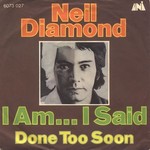
"I'm a Believer" is a song written by Neil Diamond and recorded by American band the Monkees in 1966 with the lead vocals by Micky Dolenz. The single, produced by Jeff Barry, hit the number-one spot on the U.S. Billboard Hot 100 chart for the week ending December 31, 1966, and remained there for seven weeks, becoming the last number-one hit of 1966 and the biggest-selling single for all of 1967. Billboard ranked the record as the number-five song for 1967. While originally published by Screen Gems-Columbia Music (BMI), it is now published by Stonebridge Music/EMI Foray Music (SESAC), with administration passed to Sony Music Publishing and Universal Music Publishing Group.

"Ooo Baby Baby" is a song written by Smokey Robinson and Pete Moore. It was a 1965 hit single by The Miracles for the Tamla (Motown) label.
"Young Blood" is a song written by Doc Pomus along with the songwriting team Jerry Leiber and Mike Stoller that first became a hit by The Coasters in 1957.

"Angie" is a song by the English rock band The Rolling Stones, featured on their 1973 album Goats Head Soup. It also served as the lead single on the album, released on 20 August 1973.

Stones is the seventh studio album by Neil Diamond, recorded and released in 1971. It was one of the biggest hit recordings of his career. The conductors and arrangers were Lee Holdridge, Marty Paich and Larry Muhoberac.

"America" is a song written and originally recorded by Neil Diamond, released in 1980 on the soundtrack album of Diamond's film The Jazz Singer. The song was a hit single in the United States in 1981, reaching number eight on the Billboard Hot 100, and was Diamond's sixth number one on the Adult Contemporary chart. Billboard also rated it the #62 pop single overall for 1981. Although the single version was a studio recording, overdubs of crowd cheering simulate the feel of a live performance.

"Play Me" is a 1972 song by Neil Diamond from his album Moods. The song, the first single from Moods, was recorded in February 1972 in Los Angeles. It was released as a single in May 1972 and peaked at #11 in the United States in September of that year. It was listed by Billboard as #27 of his best 30 songs.

"Does Anybody Really Know What Time It Is?" is a song written and sung by Robert Lamm and recorded by the group Chicago. It was included on their 1969 debut album Chicago Transit Authority and released as a single in 1970.
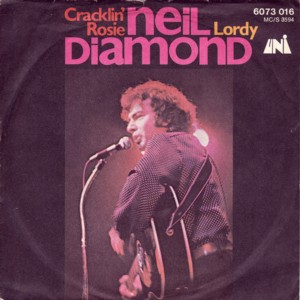
"Cracklin' Rosie" is a song written and recorded by Neil Diamond in 1970, with instrumental backing by Los Angeles session musicians from the Wrecking Crew, including Hal Blaine on drums, Larry Knechtel on keyboards, Joe Osborn on bass, Al Casey on guitar and Gene Estes on percussion – arranged by Don Randi. The song was included on Diamond's album Tap Root Manuscript. In October 1970 the song became Diamond's first American No. 1 hit within the Billboard Hot 100, and his third to sell a million copies. It was his breakthrough single on the UK Singles Chart, reaching No. 3 for four weeks in November and December. Billboard ranked the record as the No. 17 song of 1970. It also reached No. 2 in both the Australian Singles Chart and the Irish Singles Chart. Its best performance was in New Zealand, where it stayed at No. 1 for five weeks at the end of the year.

"Kentucky Woman" is a 1967 song written and originally recorded by Neil Diamond.
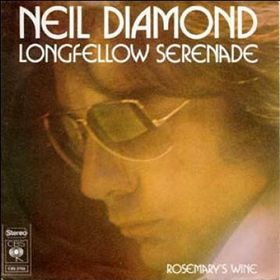
"Longfellow Serenade" is the title of a 1974 song by the American singer-songwriter Neil Diamond. It was written by Diamond, produced by Tom Catalano, and included on Diamond's album Serenade.
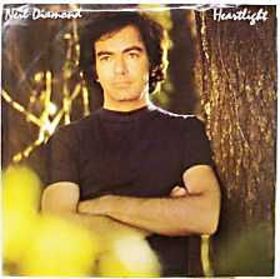
"Heartlight" is a song written by Neil Diamond, Carole Bayer Sager and her then-husband, Burt Bacharach, and recorded by Diamond in 1982. It is the first track on Diamond's 1982 album, also titled Heartlight, and reached number five on the Billboard Hot 100, becoming his thirteenth top 10 hit on the chart. It also spent four weeks atop the adult contemporary chart in late 1982, and was the last of his eight #1s on that chart. Reportedly, it was inspired by the 1982 film E.T. the Extra-Terrestrial, and Diamond allegedly settled with MCA/Universal for $25,000, due to its supposedly drawing on the material of the film.
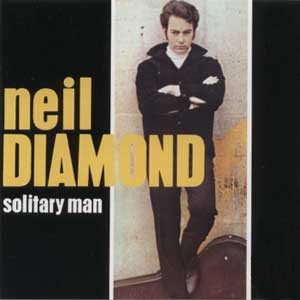
"Solitary Man" is a song written by American musician Neil Diamond, who recorded the song for Bang Records in late January 1966. It has since been covered many times, notably by T. G. Sheppard, Gianni Morandi, Chris Isaak, Johnny Cash and HIM.

"Cherry, Cherry" is a 1966 song written, composed, and recorded by American musician Neil Diamond.

"Song Sung Blue" is a 1972 hit song written and recorded by Neil Diamond, inspired by the second movement of Mozart's Piano Concerto #21. It was released on Diamond's album Moods, and later appeared on many of Diamond's live and compilation albums. The song was a #1 hit on the Billboard Hot 100 chart in the United States for one week, the week of July 1, and it spent twelve weeks in the Top 40. It also reached #14 on the UK Singles Chart.

"Shilo" is a song written and recorded by Neil Diamond. It was originally recorded in 1967 for Bang Records. Though not one of Diamond's biggest hits, "Shilo" has become one of his best-known songs, and was a staple of his concert appearances. It was included on Diamond's 1972 Hot August Night live album as well as almost all of his compilation albums.
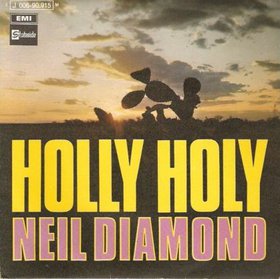
"Holly Holy" is a song written and recorded by Neil Diamond with instrumental backing provided by the American Sound Studio house band in Memphis. Released as a single on October 13, 1969, it was a successful follow-on to "Sweet Caroline", reaching #6 on the U.S. pop singles chart by December. The song also reached #5 on the Easy Listening chart. It became a gold record and then eventually a platinum record.

"Go All the Way" is a song written by Eric Carmen of American rock group the Raspberries, from their 1972 self-titled debut album. Released as a single in July 1972, the song reached the Top 5 on three principal US charts: number 5 on the Billboard Hot 100, number 4 on Cashbox, and number 3 on Record World. The single sold more than 1.3 million copies, earning the band their only certified Gold Record. It was their second single release and their biggest US hit.

"Brother Love's Travelling Salvation Show" is a song written and recorded by Neil Diamond which appeared as the opening track on the eponymous album. Released as a single in early 1969, it hit number 22 on the U.S. pop singles chart.
"Done Too Soon" is a song written, composed and performed by Neil Diamond, and released on his 1970 album Tap Root Manuscript. Listed as track 4 on side one of the album, it was jointly arranged by Marty Paich and Lee Holdridge and jointly produced by Diamond and Tom Catalano.
